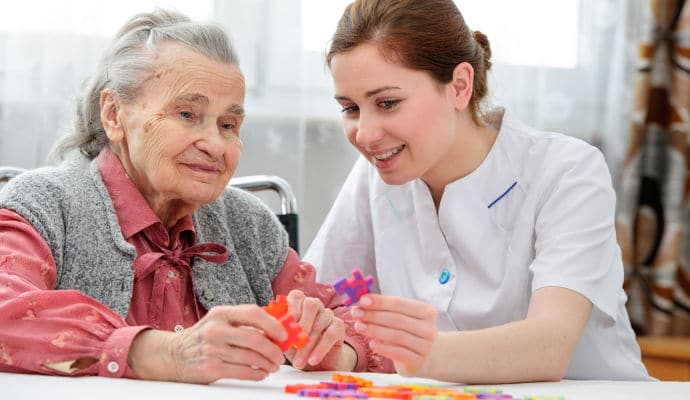Personalized Solutions for Family Members Seeking Alzheimers Care Charlotte
Personalized Solutions for Family Members Seeking Alzheimers Care Charlotte
Blog Article
Creating a Safe and Supportive Setting for Alzheimer's Treatment
The production of a safe and supportive setting for people with Alzheimer's is critical in boosting their high quality of life. Discovering these multifaceted approaches can reveal crucial understandings into reliable caregiving methods that might transform the everyday experiences of both caretakers and clients.
Understanding Alzheimer's Demands
Regularly, individuals with Alzheimer's condition exhibit a variety of requirements that require tailored techniques to care. As the problem advances, cognitive decrease materializes in numerous ways, influencing memory, reasoning, and even the ability to carry out daily activities. Caretakers should acknowledge these advancing requirements to supply ideal support and make sure a better of life for those influenced.
One critical aspect of comprehending Alzheimer's demands is acknowledging the value of routine and knowledge. Individuals frequently find comfort in recognized patterns, which can minimize stress and anxiety and confusion. Caregivers must strive to create structured daily routines that include meaningful tasks aligned with the individual's capabilities and interests.
In addition, effective communication is critical. Individuals with Alzheimer's might struggle to reveal themselves or comprehend intricate language. Caretakers need to employ simple, clear language, use non-verbal signs, and practice active listening to promote understanding and connection.
Finally, emotional and social demands can not be ignored. Giving possibilities for social communication and preserving connections can significantly enhance emotional wellness. Caretakers should urge interaction in area tasks or household gatherings, advertising a sense of belonging and function. Understanding these diverse requirements is vital for producing a helpful care environment.
Creating a Safe Home
Developing a risk-free home for people with Alzheimer's illness is necessary to promoting and minimizing risks self-reliance. The style of the living room must prioritize security while permitting individual convenience. First, eliminate potential risks such as loose carpets, sharp items, and mess, which can cause falls or crashes. Ensure that paths are well-lit and clear, as correct illumination lowers disorientation and enhances wheelchair.
Integrating adaptive attributes is also vital. Install grab bars in shower rooms and near staircases, and consider using non-slip mats in wet areas. Furthermore, making use of different colors for floorings and wall surfaces can help in identifying spaces, aiding to minimize confusion.
Experience is very important for people with Alzheimer's. Individualizing the setting with familiar objects and pictures can enhance a feeling of belonging and safety and security - Alzheimers Care Charlotte. It is likewise advantageous to have an assigned area for everyday tasks, such as analysis or crafting, which can provide framework to their day
Finally, applying a safe exterior room permits secure exploration while linking with nature. By thoughtfully creating the home environment, caregivers can dramatically enhance the high quality of life for people coping with Alzheimer's illness.
Enhancing Interaction Abilities

Non-verbal interaction, consisting of face expressions, gestures, and touch, plays a critical role in conveying empathy and understanding. Keeping eye contact and a calm behavior can enhance the convenience level of the individual, promoting a sense of safety and security.
In addition, it is essential to exercise active listening. This includes being completely present, revealing patience, and permitting the individual to share themselves without disturbance. Repetition may be necessary; caregivers should be prepared to take another look at subjects or concerns, as people with Alzheimer's may deal with memory recall.
Additionally, using aesthetic aids or hints, such as photographs or acquainted items, can promote recognition and interaction. Inevitably, enhancing interaction abilities has to do with constructing trust and producing an environment where people really feel heard, valued, and recognized, consequently enhancing their quality of life.
Motivating Social Communication
Promoting purposeful social interactions can considerably improve the wellness of individuals with Alzheimer's disease. Engaging with others not only aids combat sensations of isolation but likewise promotes cognitive feature and psychological health and wellness. Structured social tasks, such as team games, crafts and arts, or songs treatment, create chances for citizens to link with peers and caregivers, which can cause improved state of mind and decreased stress and anxiety.
Developing a welcoming environment that encourages socialization is essential. This can be accomplished by setting up common areas that help with communication, such as cozy seating areas or task areas. Furthermore, including culturally relevant and familiar activities can motivate and stimulate memories engagement, allowing people with Alzheimer's to feel more linked to their past experiences.
Moreover, caregivers should be trained to acknowledge and promote social engagement amongst locals. Straightforward gestures, such as launching discussion or promoting small seminar, can assist people feel valued and consisted of. On a regular basis arranged get-togethers must correspond yet flexible, accommodating varying levels of capability and interest. By focusing on social communication, we can significantly enhance the lives of those coping with Alzheimer's, fostering a feeling of neighborhood and belonging.
Sustaining Caregiver Wellness

To sustain caretakers, companies must use routine training and educational resources to enhance their understanding of Alzheimer's illness and caregiving techniques. Giving access to break treatment solutions permits caretakers to take essential breaks, reducing anxiety and fatigue - Alzheimers Care Charlotte. Furthermore, fostering a community through support groups can promote psychological sharing and the exchange of useful suggestions amongst caregivers, developing a network of mutual assistance
Mental wellness resources, such as therapy solutions, can likewise be important over here in addressing the emotional toll caregiving can take. By focusing on caregiver wellness, we create a more sustainable caregiving setting that not just benefits the caregivers themselves but likewise improves the total quality of care obtained by individuals with Alzheimer's. Inevitably, sustaining caregivers is an essential component in promoting a thoughtful and reliable treatment setting.
Conclusion
Finally, the production of a secure and encouraging environment for people with Alzheimer's is necessary to improving their lifestyle. By prioritizing safety with thoughtful layout, promoting emotional health with acquainted elements, and promoting involvement with structured regimens, caretakers can dramatically affect the overall experience of those impacted by this problem. Supporting caregiver wellness is important, as it eventually contributes to a much more effective and caring treatment atmosphere.
Repeating may be necessary; caretakers ought to be prepared to revisit subjects or concerns, as individuals with Alzheimer's might struggle with memory recall.

Report this page